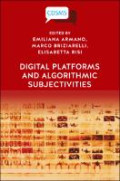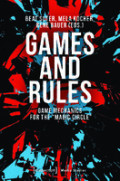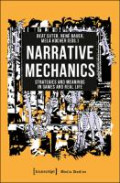
AI Art
Can computers be creative? Is algorithmic art just a form of Candy Crush? Cutting through the smoke and mirrors surrounding computation, robotics and artificial intelligence, Joanna Zylinska argues…
- Edisi
- -
- ISBN/ISSN
- 9781785420863
- Deskripsi Fisik
- ebook
- Judul Seri
- -
- No. Panggil
- -

Incorporating the Digital Commons
The concept of ‘the commons’ has been used as a framework to understand resources shared by a community rather than a private entity, and it has also inspired social movements working against t…
- Edisi
- -
- ISBN/ISSN
- 9781912656424
- Deskripsi Fisik
- ebook
- Judul Seri
- -
- No. Panggil
- -

Bioinformatics of genome evolution: from ancestral to modern metabolism
Bioinformatics, that is the interdisciplinary field that blends computer science and biostatistics with biological and biomedical sciences, is expected to gain a central role in next feature. Indee…
- Edisi
- -
- ISBN/ISSN
- 9788866550457
- Deskripsi Fisik
- ebook
- Judul Seri
- Premio Tesi di Dottorato, 21
- No. Panggil
- -

Digital China
China, literature, digital media, art
- Edisi
- -
- ISBN/ISSN
- 9789463720670
- Deskripsi Fisik
- ebook
- Judul Seri
- -
- No. Panggil
- -

Digital Platforms and Algorithmic Subjectivities
Algorithms are a form of productive power – so how may we conceptualise the newly merged terrains of social life, economy and self in a world of digital platforms? How do multiple self-quantifyin…
- Edisi
- -
- ISBN/ISSN
- 9781914386121
- Deskripsi Fisik
- ebook
- Judul Seri
- -
- No. Panggil
- -

Rhetorical Code Studies: Discovering Arguments in and around Code
Winner of the 2017 Sweetland Digital Rhetoric Collaborative Book Prize Software developers work rhetorically to make meaning through the code they write. In some ways, writing code is like any othe…
- Edisi
- -
- ISBN/ISSN
- 9780472131273
- Deskripsi Fisik
- ebook
- Judul Seri
- Sweetland Digital Rhetoric Collaborativ
- No. Panggil
- -

Algorithmic Regimes
Algorithms have risen to become one, if not the central technology for producing, circulating, and evaluating knowledge in multiple societal arenas. In this book, scholars from the social sciences,…
- Edisi
- -
- ISBN/ISSN
- 9789463728485
- Deskripsi Fisik
- ebook
- Judul Seri
- Digital Studies, 3
- No. Panggil
- -

Games and Rules
Why do we play games and why do we play them on computers? The contributors of »Games and Rules« take a closer look at the core of each game and the motivational system that is the game mechanics…
- Edisi
- -
- ISBN/ISSN
- 9783839443040
- Deskripsi Fisik
- ebook
- Judul Seri
- Edition Medienwissenschaft
- No. Panggil
- -

Narrative Mechanics
What do stories in games have in common with political narratives? This book identifies narrative strategies as mechanisms for meaning and manipulation in games and real life. It shows that the nar…
- Edisi
- -
- ISBN/ISSN
- 9783839453452
- Deskripsi Fisik
- ebook
- Judul Seri
- Edition Medienwissenschaft, 82
- No. Panggil
- -
Chapter 15 Empathizing with Robots
Typically, social robots are supposed to empathize with humans, understand human emotions, and anticipate human needs. With this chapter, the authors turn the table: What can humans learn through e…
- Edisi
- -
- ISBN/ISSN
- 9781032262673
- Deskripsi Fisik
- ebook
- Judul Seri
- -
- No. Panggil
- -
 Karya Umum
Karya Umum  Filsafat
Filsafat  Agama
Agama  Ilmu-ilmu Sosial
Ilmu-ilmu Sosial  Bahasa
Bahasa  Ilmu-ilmu Murni
Ilmu-ilmu Murni  Ilmu-ilmu Terapan
Ilmu-ilmu Terapan  Kesenian, Hiburan, dan Olahraga
Kesenian, Hiburan, dan Olahraga  Kesusastraan
Kesusastraan  Geografi dan Sejarah
Geografi dan Sejarah